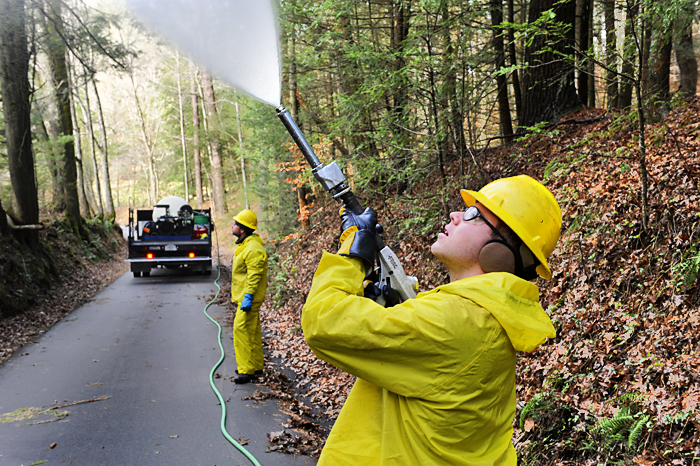By Morgan Simmons
simmonsm@knoxnews.com
TOWNSEND, Tenn. - Christmas came early to the hemlocks in Cades Cove this week in the form of a horticultural spray that rids the trees of an exotic insect that has spread throughout the Great Smoky Mountains National Park.
On Thursday the National Park Service wrapped up its second day of hemlock woolly adelgid treatment in Cades Cove. Since 2002 when it was discovered near Fontana Lake in North Carolina, the tiny Asian insect has decimated the park's hemlocks, prompting retaliatory measures that includes treating roadside trees with a spray that coats the adelgids with soap and oil and causes them to suffocate.
In addition to Cades Cove, the park's frontcountry efforts to save the hemlocks includes picnic areas, cemeteries, and campground. A select number of trees are treated in the park's backcountry, too, but with a systemic insecticide that must be applied by hand.
Park forester Jesse Webster said keeping the hemlocks alive in high-use areas like Cades Cove is important to visitor safety, beneficial to nesting songbirds, and just plain important to preserving the Cove's classic look.
"We're trying to keep Cades Cove green," Webster said.
On Wednesday all of Cades Cove was closed to motorized traffic while crews worked around the entrance and exit areas of the Loop Road. On Thursday, the west end of the Loop Road past Hyatt Lane was closed as crews and the park's two spray trucks worked the Cove's thickest hemlock stands.
The entire 11-mile Cades Cove Loop Road is scheduled to reopen to motorized traffic today.
The larger truck - nicknamed "Moose" - carried a 500-gallon tank. With 650 pounds per square inch of pressure, the sprayer was able to shoot the oil-soap liquid 50 feet. Add to this the length of the hose, and the spraying application was able to reach trees 150 feet from the road.
The park's two spray trucks were funded through Friends of the Smokies. Further funding for the project comes from the U.S. Forest Service, individual donors, the National Park Service, and from sales of a special "Save The Hemlocks" T-shirt that has raised $30,000 since 2002.
In addition to the frontcountry spraying, the park also applies a systemic insecticide to backcountry hemlocks in selected Hemlock Conservation Areas totaling 3,900 acres.
The chemical treatments in the frontcountry and backcountry are considered a stopgap measure to preserve as many hemlocks as possible until predator beetles that have been released in the Smokies become an effective biological control.
by feeding on the hemlock woolly adelgid. So far, the National Park Service, working with the University of Tennessee, has released 500,000 predator beetles in the Smokies.
Webster said the recent drop in price of the systemic insecticide (imidacloprid) will enable the park to combine that treatment with roadside spraying to provide a more cost-effective means of adelgid control in frontcountry areas like Cades Cove.
He added that now is a good time to treat the park's salvageable hemlocks because the trees have hit a post-drought growth spurt that promotes the uptake of the insecticides.
"We have a window of opportunity to help the hemlocks as much as we can," Webster said.
Morgan Simmons may be reached at 865-342-6321.
